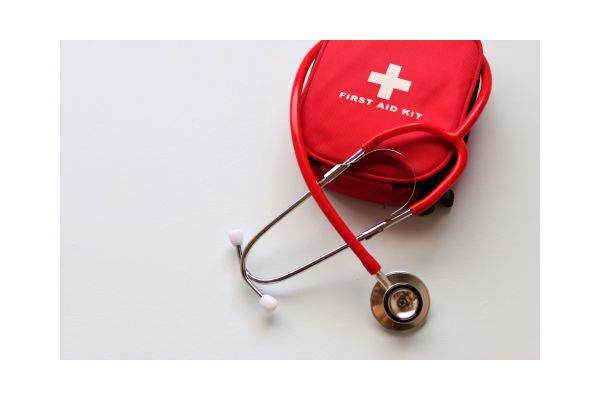
What is Food Poisoning?
Foodborne sickness, commonly referred to as food poisoning, is a severe ailment that arises from consuming tainted food or drinks. Numerous substances, such as bacteria, viruses, parasites, or toxins, can cause contamination, which can result in a variety of gastrointestinal system symptoms. First aid treatment for food poisoning in infants is very important, it is also important for parents and caregivers to know and understand some symptoms of food poisoning and how to properly care for a child with food poisoning.
Causes of Food Poisoning
- Bacteria:
- Salmonella: this is found in raw poultry, eggs, and unpasteurized milk.
- Escherichia coli (E. coli): often associated with undercooked ground beef, contaminated vegetables, and unpasteurized juices.
- Listeria monocytogenes: Found in unpasteurized dairy products and ready-to-eat meats, like deli meats and hot dogs.
- Campylobacter: Frequently present in raw or undercooked poultry and untreated water.
- Viruses:
- Norovirus: A leading cause of foodborne illness, often linked to leafy greens, fresh fruits, and shellfish.
- Hepatitis A: Can be spread through contaminated water or food handled by someone who is infected.
- Parasites:
- Giardia: Can contaminate water and food, leading to gastrointestinal issues.
- Toxoplasma gondii: Often found in undercooked contaminated meat, especially pork, lamb, and venison.
- Toxins:
- Staphylococcus aureus: Produces toxins that can survive cooking and can be found in improperly stored food.
- Clostridium botulinum: Produces a potent toxin in improperly canned or preserved foods.

Symptoms of Food Poisoning
The symptoms of food poisoning can vary based on the contaminant involved but typically include:
- Nausea and Vomiting: One of the first signs, often leading to rapid dehydration, especially dangerous in infants.
- Diarrhea: Can be watery or bloody, leading to further dehydration.
- Abdominal Pain and Cramping: Intense discomfort caused by inflammation and infection of the gastrointestinal tract.
- Fever: Indicates the body is fighting off an infection.
- Lethargy and Weakness: Resulting from dehydration and lack of nutrients due to vomiting and diarrhea.
Risk Factor
Although food poisoning can affect anyone, some populations are more vulnerable to serious consequences, such as:
Little Children: Because of their immature immune systems and increased vulnerability to dehydration.
Older People: Frequently suffer from underlying medical issues and compromised immune systems.
Women who are pregnant: Are more vulnerable to infections like Listeria that can harm the developing foetus.
People suffering with chronic illnesses: HIV/AIDS, diabetes, and other conditions that might weaken the immune system.
Identifying Infant Food Poisoning Symptoms
Because of their smaller bodies and still-developing immune systems, infants are especially vulnerable to the consequences of food poisoning. Early symptom detection is essential for effective treatment and to avoid consequences. These are the typical signs to be aware of.
Common Symptoms
Vomiting
Description: Consistent, violent vomiting of stomach contents.
Importance: Infants who vomit may soon become dehydrated due to their small bodies losing fluids quickly. It also means that the body is making an effort to get rid of the toxic material.
Diarrhea
Description: Frequent, watery, or loose stools.
Importance: Diarrhea causes substantial fluid and electrolyte loss, similar to vomiting, which can result in dehydration and electrolyte abnormalities in newborns. Blood or mucus may also be present with diarrhea, which would suggest a more serious infection.
Fever
Description: An elevated body temperature, typically above 100.4°F (38°C).
Importance: Fever is a common response to infection as the body fights off pathogens. Persistent or very high fever can be dangerous for infants and may indicate a serious underlying condition.
Abdominal Pain and Cramping
Description: Infants may show signs of discomfort, such as crying, pulling their legs towards their abdomen, or a distended stomach.
Importance: Abdominal pain and cramping suggest inflammation or irritation of the gastrointestinal tract. It can cause significant discomfort and distress in infants.

Lethargy and Irritability
Description: Excessive tiredness, difficulty staying awake, or being unusually fussy and hard to console.
Importance: Lethargy and irritability can be signs of dehydration and general discomfort from the illness. These symptoms indicate that the infant’s overall condition is affected and may require medical attention.
Other Signs to Look Out for
Although food poisoning is frequently indicated by the symptoms listed above, there are other symptoms that could point to a more serious disease or complications:
1. Reduced Urine Production: If you’re not peeing as much as normal, you may be dehydrated.
2. Sunken Eyes and Fontanelle: Fontanelle and sunken eyes are indicators of extreme dehydration.
3 .Dry Mouth and Tongue: Another sign of dehydration is a lack of saliva or dry mucous membranes.
4. Unusual Drowsiness or Difficulty Waking: This has to be checked out right once because it may indicate a dangerous infection or dehydration.
5. Blood in Stool or Vomit: This can indicate a severe infection or other serious condition.
Monitoring and Immediate Actions
- Hydration: Ensure the infant is hydrated. If breastfeeding, continue to breastfeed. If formula-fed, offer small, frequent feeds.
- Oral Rehydration Solutions (ORS): Use ORS to replenish fluids and electrolytes. These solutions are designed specifically for infants and can be found at pharmacies.
- Comfort: Keep the infant comfortable and monitor their condition closely.
- Record Symptoms: Keep track of the frequency and nature of vomiting and diarrhea, fever readings, and any other symptoms.
When to Seek Medical Help
- Persistent Symptoms: If vomiting or diarrhea persists for more than a few hours.
- High Fever: A temperature above 100.4°F (38°C) in infants younger than 3 months, or above 102°F (39°C) in older infants.
- Signs of Severe Dehydration: Such as dry mouth, sunken eyes, or a decrease in urine output.
- Blood in Stool or Vomit: This is a sign of a potentially serious infection.
- Unresponsive or Lethargic: If the infant is unusually drowsy, difficult to wake, or not responding normally.
First Aid Treatment for Food Poisoning in Infant
- Stay Calm: Keep calm to avoid alarming the infant and to think clearly.
- Hydration is Key:
- Breastfeeding or Formula: Continue breastfeeding or formula feeding. For formula-fed babies, offer smaller, more frequent feeds.
- Oral Rehydration Solutions (ORS): Use ORS to replace lost fluids and electrolytes. These are available at pharmacies and are specifically formulated for infants.
- Avoid Plain Water: Infants need the nutrients and electrolytes found in breast milk, formula, or ORS.
Record Symptoms:
-
- Keep track of the frequency and nature of vomiting and diarrhea.
- Note any fever readings and other symptoms to provide accurate information to healthcare providers if needed.

When to Seek Medical Help
- Persistent Symptoms: If vomiting or diarrhea lasts more than a few hours.
- High Fever: If the infant’s temperature is above 100.4°F (38°C) for infants younger than 3 months, or above 102°F (39°C) for older infants.
- Signs of Severe Dehydration: As noted earlier, if there are any signs of severe dehydration.
- Blood in Stool or Vomit: This can indicate a more serious infection or condition.
- Unresponsive or Lethargic: If the infant is unusually drowsy, difficult to wake, or not responding normally.
Preventative Measures
- Hygiene: Ensure all feeding utensils, bottles, and pacifiers are properly sterilized.
- Safe Food Handling: Follow guidelines for preparing and storing food. Avoid giving honey to infants under one year old.
- Monitoring Foods: Introduce new foods one at a time to monitor for any adverse reaction

How to Avoid Food Poisonings in Infants
1. Breastfeeding: Due to the presence of antibodies that might aid in infection prevention, breast milk is the safest meal for newborns.
2. Handle with care: Wash your hands well with soap and water before preparing formula or baby food. Ensure that every piece of equipment and utensils is sterilized and clean.
3.Safely store: Keep baby formula and food in a dry, cool environment. Verify the expiration dates and dispose of any spoiled or expired food.
4. Cook to perfection: To ensure that hazardous germs are killed, baby food must be cooked to an internal temperature of at least 165°F (74°C).
5.Steer clear of raw or undercooked food: Since eggs, pork, chicken, and fish can harbor dangerous bacteria like E. coli and Salmonella, it is best to avoid providing them to babies when they are still young.
6. Keep it clean: Whenever surfaces and utensils come into touch with baby food or formula, give them a routine cleaning and sanitization.
7. Keep an eye out for sickness symptoms: Diarrhea, vomiting, fever, and blood in the stool or vomit are all indicators of food poisoning in newborns. Should you have any suspicions about food poisoning, get help right once.
Conclusion
It is critical for carers to be aware of the first aid protocol for newborn food poisoning in order to deliver timely and efficient care. In order to replace lost fluids and electrolytes, it is crucial to priorities hydration through breastfeeding, formula feeding, and the use of oral rehydration treatments. Supporting the infant’s recuperation requires avoiding simple water and making sure they are drinking nutrient-rich fluids like breast milk, formula, or ORS. Furthermore, maintaining the infant’s composure, keeping an eye on symptoms, and understanding when to seek medical attention are essential components of safeguarding their wellbeing throughout episodes of food poisoning. For infants suffering from food poisoning, carers can assist avoid complications and guarantee a speedy recovery by adhering to these rules and consulting healthcare specialists as needed.